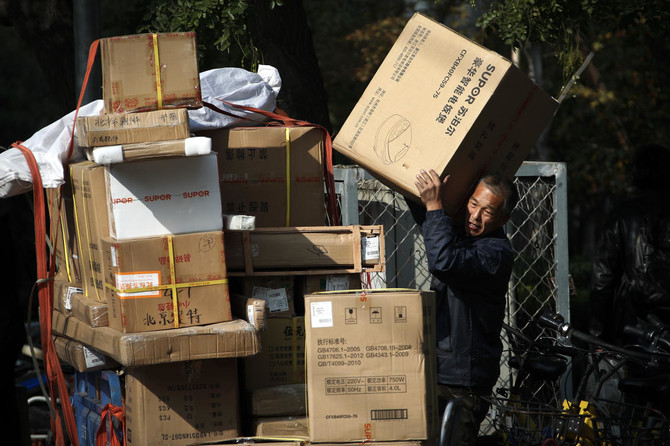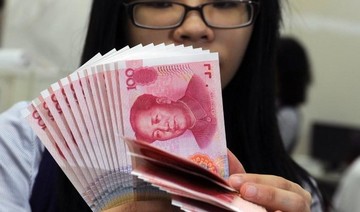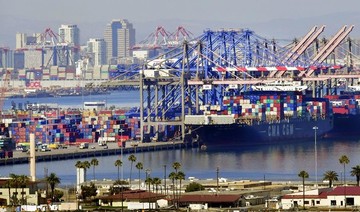BEIJING: China’s economic growth slowed further in the latest quarter, adding to challenges for communist leaders as they fight a tariff battle with Washington.
The world’s second-largest economy expanded by 6.5 percent over a year earlier in the three months ending in September, government data showed Friday. That was down from 6.7 percent for the quarter ending in July and 6.8 percent for the year’s first three months.
Forecasters expected China’s economy to cool after Beijing tightened credit controls last year to rein in a debt boom. But the slowdown has been sharper than expected, prompting Chinese leaders to reverse course and encourage banks to lend.
Communist leaders express confidence their $12 trillion-a-year economy can survive the conflict with US President Donald Trump. But export industries have begun to suffer from American tariff hikes of up to 25 percent on Chinese goods.
Economic performance was “stable overall,” but “we must also see the number of external challenges has increased significantly,” said a government spokesman, Mao Shengyong.
“Downward pressure has increased,” Mao said at a news conference.
Growth in retail spending and investment in factories and other fixed assets, which are much bigger parts of the economy than trade, slowed in the latest quarter, though to still-robust rates.
Retail sales rose 9.1 percent over a year earlier in the first nine months of the year, down 0.1 percent from the first half, according to the National Bureau of Statistics. Investment in factories and other fixed assets rose 5.4 percent in the first three quarters, down 0.6 percent from the first half.
Beijing has rejected US pressure to scale back industrial development plans Washington says are based on stealing or pressuring foreign companies to hand over technology. American officials worry they might threaten US industrial leadership.
The conflict with Washington has prompted communist leaders to step up the pace of a marathon effort to encourage self-sustaining growth driven by domestic consumption and reduce reliance on exports and investment.
Beijing has announced tariff cuts, announced plans to end restrictions on foreign ownership in the Chinese auto industry and taken other steps to rev up growth. But leaders have rejected pressure to scrap plans such as “Made in China 2025,” which calls for state-led creation of Chinese champions in robotics and other technologies.
Washington, Europe and other trading partners complain those plans violate Beijing’s market-opening commitments.
Beijing has responded to previous downturns by flooding the state-dominated economy with credit, but that has swelled debt. The ruling Communist Party has told banks to step up lending, especially to private entrepreneurs who generate China’s new jobs and wealth, but has avoided a full-scale stimulus. Forecasters say it will take the measures some time to work their way through the economy.
Washington has raised tariffs on $250 billion of Chinese goods and Trump says he might extend penalties to almost all imports from China. Beijing responded with its own tariff hikes on $110 billion of American imports but is running out of goods for retaliation due to their lopsided trade balance.
Forecasters say if threatened tariff hikes by both sides are fully carried out, that could cut China’s 2019 growth by up to 0.3 percentage points.
September exports to the United States rose 13 percent despite the tariff hikes, down slightly from August’s 13.4 percent. The country’s politically volatile trade surplus with the United States widened to a record $34.1 billion.
Chinese exporters of lower-value goods such as clothes say American orders fell off starting in April as trade tensions worsened. But makers of factory equipment, medical technology and other high-value goods express confidence they can keep their market share.
Trade accounts for a smaller share of the economy than it did a decade ago but still supports millions of jobs.
On Thursday, the Commerce Ministry promised official help for companies that have suffered due to the American import controls.
“In general, the impact is limited,” said a ministry spokesman, Gao Feng. “Governments at all levels will also take active measures to help enterprises and employees cope with possible difficulties.”
China’s economic growth slows amid trade battle with US
China’s economic growth slows amid trade battle with US

- The world’s second-largest economy expanded by 6.5 percent over a year earlier in the three months ending in September
- ‘Downward pressure has increased,’ government spokesman Mao Shengyong Mao says
Open Forum Riyadh to discuss digital currency, AI, and mental health

- The event will run in parallel to the WEF’s Special Meeting on Global Collaboration
LONDON: The Open Forum Riyadh — a series of public sessions taking place in the Saudi capital on Sunday and Monday — will “spotlight global challenges and opportunities,” according to the organizers.
The event, a collaboration between the World Economic Forum and the Saudi Ministry of Economy and Planning, will run in parallel to the WEF’s Special Meeting on Global Collaboration, Growth and Energy for Development, taking place in Riyadh on April 28 and 29.
“Under Saudi Vision 2030, Riyadh has become a global capital for thought leadership, action and solutions, fostering the exchange of knowledge and innovative ideas,” Faisal F. Alibrahim, Saudi minister of economy and planning, said in a press release, adding that this year’s Open Forum being hosted in Riyadh “is a testament to the city’s growing influence and role on the international stage.”
The forum is open to the public and “aims to facilitate dialogue between thought leaders and the broader public on a range of topics, including environmental challenges, mental health, digital currencies, artificial intelligence, the role of the arts in society, modern-day entrepreneurship, and smart cities,” according to a statement.
The agenda includes sessions addressing the impact of digital currencies in the Middle East, the role of culture in public diplomacy, urban development for smart cities, and actions to enhance mental wellbeing worldwide.
The annual Open Forum was established in 2003 with the goal of enabling a broader audience to participate in the activities of the WEF, and has been hosted in several different countries, including Cambodia, India, Jordan and Vietnam.
The panels will feature government officials, artists, civil-society leaders, entrepreneurs, and CEOs of multinationals.
This year’s speakers include Yazeed A. Al-Humied, deputy governor and head of MENA investments at the Saudi Pubic Investment Fund; Princess Reema Bandar Al-Saud, Saudi Arabia’s ambassador to the US; and Princess Beatrice, founder of the Big Change Charitable Trust and a member of the British royal family.
Michele Mischler, head of Swiss public affairs and sustainability at the WEF, said in a press release that the participation of the public in Open Forum sessions “fosters diverse perspectives, enriches global dialogue, and empowers collective solutions for a more inclusive and sustainable future.”
Meituan looks to hire in Saudi Arabia, indicating food delivery expansion

SHANGHAI: Chinese food delivery giant Meituan is seeking to hire staff for at least eight positions based in Riyadh, in a sign it may be looking to Saudi Arabia to further its global expansion ambitions, according to Reuters.
The jobs ads, which is hiring for KeeTa, the brand name Meituan uses for its food delivery operations in Hong Kong, is seeking candidates with expertise in business development, user acquisition, and customer retention, according to posts seen by Reuters on Linkedin and on Middle Eastern jobs site Bayt.com.
Meituan did not immediately respond to a request for comment by Reuters on its plans for Saudi expansion.
Bloomberg reported earlier on Friday that the Beijing-based firm would make its Middle East debut with Riyadh as the first stop.
Since expanding to Hong Kong in May 2023, Meituan’s first foray outside of mainland China, speculation has persisted that its overseas march would continue as the firm searches for growth opportunities, with the Middle East rumored since last year to be one area of possible expansion.
“We are actively evaluating opportunities in other markets,“ Meituan CEO Wang Xing said during a post-earnings call with analysts last month.
“We have the tech know-how and operational know-how, so we are quietly confident we can enter a new market and find an approach that works for consumers there.”
IMF opens first MENA office in Riyadh

RIYADH: The International Monetary Fund has opened its first office the Middle East and North Africa region in Riyadh.
The office was launched during the Joint Regional Conference on Industrial Policy for Diversification, jointly organized by the IMF and the Ministry of Finance, on April 24.
The new office aims to strengthen capacity building, regional surveillance, and outreach to foster stability, growth, and regional integration, thereby promoting partnerships in the Middle East and beyond, according to the Saudi Press Agency.
Additionally, the office will facilitate closer collaboration between the IMF and regional institutions, governments, and other stakeholders, the SPA report noted, adding that the IMF expressed its appreciation to Saudi Arabia for its financial contribution aimed at enhancing capacity development in its member countries, including fragile states.
Abdoul Aziz Wane, a seasoned IMF director with an extensive understanding of the institution and a broad network of policymakers and academics worldwide, will serve as the first director of the Riyadh office.
Saudi minister to deliver keynote speech at Automechanika Riyadh conference

RIYADH: Saudi Arabia’s Deputy Minister of Investment Transaction Saleh Al-Khabti is set to deliver the keynote speech at a global automotive aftermarket industry conference in Riyadh.
Set to be held from April 30 April to May 2 in the Saudi capital’s International Convention and Exhibition Center, Automechanika Riyadh will welcome more than 340 exhibitors from over 25 countries.
Al-Khabti will make the marquee address on the first day of the event, which will also see participation from Aftab Ahmed, chief advisor for the Automotive Cluster at the National Industrial Development Centre, Ministry of Industry and Mineral Resources.
Saudi Arabia’s automotive sector is undergoing a transformation, with the Kingdom’s Public Investment Fund becoming the major shareholder in US-based electric vehicle manufacturer Lucid, and also striking a deal with Hyundai to collaborate on the construction of a $500 million-manufacturing facility.
Alongside this, Saudi Arabia’s Crown Prince Mohammed bin Salman launched the Kingdom’s first electric vehicle brand in November 2022.
Commenting on the upcoming trade show, Bilal Al-Barmawi, CEO and founder of 1st Arabia Trade Shows & Conferences, said: “It is a great honor for Automechanika Riyadh to be held under the patronage of the Saudi Arabian Ministry of Investment, and we’re grateful for their continued support as the event goes from strength-to-strength.
“The insights and support we’ve already received have been invaluable, and we look forward to continuing this relationship throughout the event and beyond.”
This edition of Automechanika Riyadh will feature seven product focus areas, including parts and components, tyres and batteries, and oils and lubricants.
Accessories and customizing, diagnostics and repairs, and body and paint will also be discussed, as well as care and wash.
Aly Hefny, show manager for Automechanika Riyadh, Messe Frankfurt Middle East, said: “The caliber of speakers confirmed to take part at Automechanika Riyadh is a testament to the event’s growth and prominence within the regional automotive market.
“We have developed a show that goes beyond the norm by providing a platform that supports knowledge sharing and networking while promoting the opportunity to engage with key industry experts and hear the latest developments, trends and innovations changing the dynamics of the automotive sector.”
Aramco-backed S-Oil expects Q2 refining margins to remain steady then trend upward

SEOUL: South Korea’s S-Oil forecast on Friday that second-quarter refining margins will be steady, supported by regular maintenance in the region, then trend upward in tandem with higher demand as the summer season gets underway, according to Reuters.
Over the January-March period, the refiner said it operated the crude distillation units at its 669,000-barrel-per-day oil refinery in the southeastern city of Ulsan at 91.9 percent of capacity, compared with 94 percent in October-December.
S-Oil, whose main shareholder is Saudi Aramco, plans to shut its No. 1 crude distillation unit sometime this year for maintenance, the company said in an earnings presentation, without specifying the time.

















